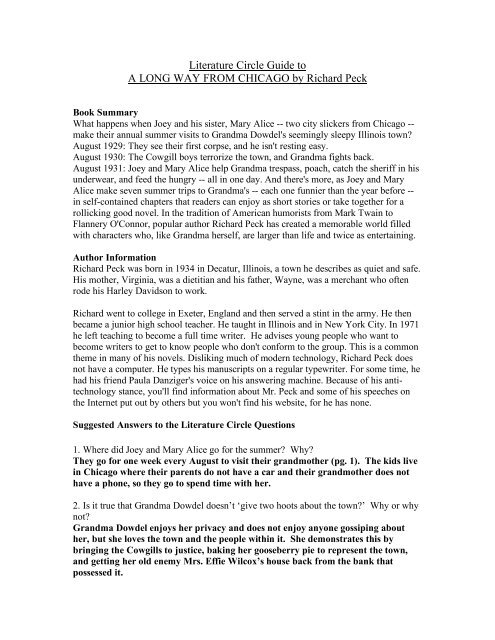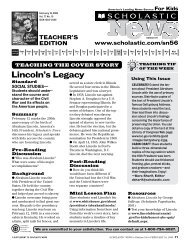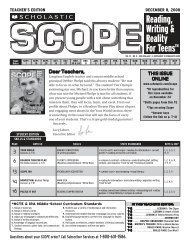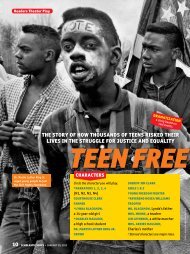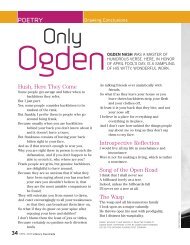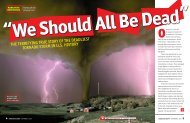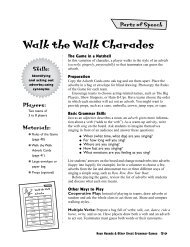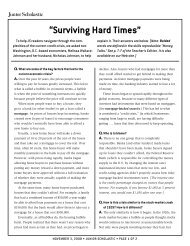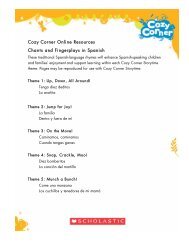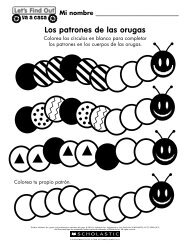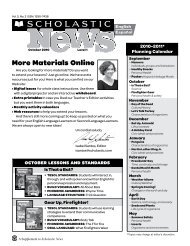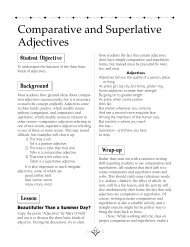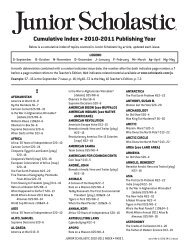Literature Circle Guide to A LONG WAY FROM ... - Scholastic
Literature Circle Guide to A LONG WAY FROM ... - Scholastic
Literature Circle Guide to A LONG WAY FROM ... - Scholastic
Create successful ePaper yourself
Turn your PDF publications into a flip-book with our unique Google optimized e-Paper software.
<strong>Literature</strong> <strong>Circle</strong> <strong>Guide</strong> <strong>to</strong><br />
A <strong>LONG</strong> <strong>WAY</strong> <strong>FROM</strong> CHICAGO by Richard Peck<br />
Book Summary<br />
What happens when Joey and his sister, Mary Alice -- two city slickers from Chicago --<br />
make their annual summer visits <strong>to</strong> Grandma Dowdel's seemingly sleepy Illinois <strong>to</strong>wn?<br />
August 1929: They see their first corpse, and he isn't resting easy.<br />
August 1930: The Cowgill boys terrorize the <strong>to</strong>wn, and Grandma fights back.<br />
August 1931: Joey and Mary Alice help Grandma trespass, poach, catch the sheriff in his<br />
underwear, and feed the hungry -- all in one day. And there's more, as Joey and Mary<br />
Alice make seven summer trips <strong>to</strong> Grandma's -- each one funnier than the year before --<br />
in self-contained chapters that readers can enjoy as short s<strong>to</strong>ries or take <strong>to</strong>gether for a<br />
rollicking good novel. In the tradition of American humorists from Mark Twain <strong>to</strong><br />
Flannery O'Connor, popular author Richard Peck has created a memorable world filled<br />
with characters who, like Grandma herself, are larger than life and twice as entertaining.<br />
Author Information<br />
Richard Peck was born in 1934 in Decatur, Illinois, a <strong>to</strong>wn he describes as quiet and safe.<br />
His mother, Virginia, was a dietitian and his father, Wayne, was a merchant who often<br />
rode his Harley Davidson <strong>to</strong> work.<br />
Richard went <strong>to</strong> college in Exeter, England and then served a stint in the army. He then<br />
became a junior high school teacher. He taught in Illinois and in New York City. In 1971<br />
he left teaching <strong>to</strong> become a full time writer. He advises young people who want <strong>to</strong><br />
become writers <strong>to</strong> get <strong>to</strong> know people who don't conform <strong>to</strong> the group. This is a common<br />
theme in many of his novels. Disliking much of modern technology, Richard Peck does<br />
not have a computer. He types his manuscripts on a regular typewriter. For some time, he<br />
had his friend Paula Danziger's voice on his answering machine. Because of his antitechnology<br />
stance, you'll find information about Mr. Peck and some of his speeches on<br />
the Internet put out by others but you won't find his website, for he has none.<br />
Suggested Answers <strong>to</strong> the <strong>Literature</strong> <strong>Circle</strong> Questions<br />
1. Where did Joey and Mary Alice go for the summer? Why?<br />
They go for one week every August <strong>to</strong> visit their grandmother (pg. 1). The kids live<br />
in Chicago where their parents do not have a car and their grandmother does not<br />
have a phone, so they go <strong>to</strong> spend time with her.<br />
2. Is it true that Grandma Dowdel doesn’t ‘give two hoots about the <strong>to</strong>wn?’ Why or why<br />
not?<br />
Grandma Dowdel enjoys her privacy and does not enjoy anyone gossiping about<br />
her, but she loves the <strong>to</strong>wn and the people within it. She demonstrates this by<br />
bringing the Cowgills <strong>to</strong> justice, baking her gooseberry pie <strong>to</strong> represent the <strong>to</strong>wn,<br />
and getting her old enemy Mrs. Effie Wilcox’s house back from the bank that<br />
possessed it.
3. Who won the blue ribbon for the best gooseberry pie? Explain.<br />
Rupert Pennypacker received the blue ribbon for the best gooseberry pie, but<br />
Grandma was actually the one who baked it. Grandma was afraid that her pie<br />
would lose <strong>to</strong> Mr. Pennypackers and she wanted the blue ribbon, so she switched<br />
nametags on the pies (pg. 78).<br />
4. Who is the ‘One Woman Crime Wave?’ Why is she described this way?<br />
Grandma is the ‘One Woman Crime Wave.’ She is described this way because she<br />
brews beer even though it is the Prohibition, she illegally traps catfish in fish traps,<br />
(pg. 45) and she feeds the drifters that the Sheriff has <strong>to</strong>ld <strong>to</strong> get out of <strong>to</strong>wn (pg. 58).<br />
5. How do Joey and Mary Alice change during The Day of Judgement? What do they<br />
believe at the beginning of the chapter? What do they believe at the end?<br />
At the beginning of the chapter, they believe that Grandma would do anything <strong>to</strong><br />
win a challenge, but in her quest <strong>to</strong> win the blue ribbon for the best gooseberry pie<br />
she lost the blue ribbon that she actually won and deserved by switching name tags<br />
with a competi<strong>to</strong>r. At the end, they see that you need <strong>to</strong> believe in yourself and your<br />
best effort. They also come <strong>to</strong> see that Grandma will do anything <strong>to</strong> help them get<br />
what they want out of life. For example, Grandma, without seeming <strong>to</strong>, gave Joe the<br />
winning ride in the airplane.<br />
6. List all the things (activities, money, <strong>to</strong>ols, etc.) that were different in the 1930’s from<br />
<strong>to</strong>day. Then make a list of things that are the same.<br />
Different: Milk was delivered, few people had telephones, few people owned cars,<br />
many people grew their own food, few women worked outside of their homes, less<br />
money could purchase much more, and it was illegal <strong>to</strong> drink alcohol.<br />
Same: Kids jumped rope, people fished, people traveled by train, people went <strong>to</strong> the<br />
movies for entertainment, people gossiped, neighbors helped each other out, and<br />
<strong>to</strong>wn fairs and talent shows were held.<br />
7. When do you think Joe s<strong>to</strong>ps thinking of Grandma Dowdel as a bad influence? Why?<br />
Does Mary Alice have different ideas about Grandma Dowdel? Why?<br />
Joe s<strong>to</strong>ps thinking of Grandma Dowdel as a bad influence after the gooseberry pie<br />
contest. He realized that Grandma was going <strong>to</strong> do anything <strong>to</strong> get him the ride that<br />
he wanted in airplane. Joe came <strong>to</strong> see that most of the crazy things Grandma did<br />
were <strong>to</strong> benefit her friends and family, and in her own rough and gruff way she was<br />
constantly telling them how much she loved them. By 1932, their fourth summer<br />
with Grandma, Mary Alice has begun <strong>to</strong> really enjoy and look up <strong>to</strong> Grandma. She<br />
recognizes Grandma’s warmth and caring, but loves that Grandma is independent,<br />
smart, and will find a way <strong>to</strong> get what she wants. She sees her as a unique and<br />
wonderful woman.<br />
8. Describe how Grandma Dowdel goes about getting justice from the Cowgills? What<br />
do you think would be Grandma’s definition of justice?
Grandma Dowdel knew that the Cowgills knocked down her mailbox and Effie<br />
Wilcox’s privies. So when her milk was next delivered she left her gun out <strong>to</strong> show<br />
the Cowgills what they could steal, lied <strong>to</strong> Ernie Cowgill that she was leaving <strong>to</strong>wn,<br />
and lied that she had found a dead mouse in her milk. As expected, the Cowgills<br />
came <strong>to</strong> her home <strong>to</strong> steal her gun. She caught them and had their parents brought<br />
<strong>to</strong> her home <strong>to</strong> show them what their sons were up <strong>to</strong>. Then she demanded that the<br />
Cowgills pay for the screen that the boys cut and buy her a new mailbox. Then she<br />
showed the Cowgills the bottle of milk that she had added a mouse <strong>to</strong> and claimed<br />
the boys had done it. She said that she would spread rumors that the boys often did<br />
this <strong>to</strong> hurt the Cowgills business. Grandma did not think it was right for the boys<br />
<strong>to</strong> prey on old widows and demanded that the boys be whipped by their father. I<br />
think Grandma would define justice as ‘an eye for an eye.’ If the Cowgill boys<br />
thought they were going <strong>to</strong> hurt her by destroying her mailbox, then she was going<br />
<strong>to</strong> hurt them right back using their parents <strong>to</strong> punish them (pgs. 19-35).<br />
9. Do you notice any different rules or expectations for men and women in Grandma<br />
Dowdel’s <strong>to</strong>wn? Are there things men can do that women can’t? Are there things that<br />
women can do that men can’t? How do you think Grandma Dowdel would have behaved<br />
differently if she were a man?<br />
In the 1930’s, men and women typically had more distinct and different roles. Men<br />
would earn money for their families while women tended <strong>to</strong> the business of a home<br />
like raising children, cooking, and cleaning. It would have been strange for the<br />
women <strong>to</strong> work as bankers and the men <strong>to</strong> stay at home. But as Grandma Dowdel<br />
shows, she is completely self sufficient and does the jobs of both a man and a<br />
woman. She farms, cooks, cleans, takes care of her family and friends. Grandma<br />
Dowdel does as she pleases and does not worry about what other think of her<br />
behavior, so her behavior wouldn’t change much if she were a man.<br />
10. How does Joey feel about Grandma Dowdel’s fish trap? Does he have any problems<br />
with it? What does he like about it?<br />
Joey doesn’t know what <strong>to</strong> feel about Grandma Dowdel’s fish trap because he<br />
knows that using a fish trap was illegal and could carry a five dollar fine. His father<br />
was also a member of the Conservation Club who tied his own flies and valued good<br />
sportsmanship (pg. 45). So because of his father, Joey feel the trap might not be<br />
right <strong>to</strong> use, but he liked the fishing was done all at once (pg. 46).<br />
11. Even though they never appear in the s<strong>to</strong>ry, what do you think Joe’s and Mary Alice’s<br />
parents are like? What clues can you find in the s<strong>to</strong>ry <strong>to</strong> their personalities?<br />
Joe and Mary Alice say that their parents would not let them do see John Dillinger’s<br />
body, they were city people, their father loved fishing (pg. 45), and they paid for<br />
Mary Alice <strong>to</strong> take dance lessons. It sounds like they are conservative and don’t<br />
want <strong>to</strong> take <strong>to</strong>o many risks by illegally fishing or letting their children view a dead<br />
body (pg. 103). But one of them had Grandma Dowdel as a parent, so she probably<br />
instilled in her children a sense of adventure and love of life.
12. Explain what Grandma Dowdel means by ‘apart from its his<strong>to</strong>rical significance’ on<br />
page 117.<br />
Grandma manufactured his<strong>to</strong>rical artifacts that she claimed were found in Effie<br />
Wilcox’s home. She made a quilt look like it belonged <strong>to</strong> Mary Todd Lincoln (pg.<br />
113) and a s<strong>to</strong>vepipe hat look like it belonged <strong>to</strong> Abraham Lincoln (pg. 114). The<br />
<strong>to</strong>wnspeople believed in these artifacts and Grandma was able <strong>to</strong> claim that Lincoln<br />
once spent time in Mrs. Wilcox’s home and that it should not be <strong>to</strong>rn down by the<br />
bank. Thus Grandma was saying that the home had no value apart from its<br />
his<strong>to</strong>rical significance, a significance that was fabricated by Grandma.<br />
13. Who is the better role model for the kids: O.B. Dickerson or Grandma Dowdel?<br />
Why? What is a role model supposed <strong>to</strong> provide?<br />
Grandma Dowdel is a much better role model. The sheriff, O.B. Dickerson,<br />
pretends <strong>to</strong> uphold the law, but instead he gets drunk with his fishing pals (pg. 49)<br />
and tries <strong>to</strong> run starving drifters out of <strong>to</strong>wn so that they don’t bother the<br />
<strong>to</strong>wnspeople (pg. 58). Whereas Grandma often breaks the law, but she always does<br />
in order <strong>to</strong> benefit a person in need or <strong>to</strong> demonstrate the error in a person’s ways.<br />
A role model should be a model of good behavior that young people can turn <strong>to</strong> as a<br />
guide. Grandma makes a wonderful role model because she is smart, resourceful,<br />
just, generous, and consistently works <strong>to</strong> benefit and enrich the lives of other people<br />
in her <strong>to</strong>wn.<br />
14. Look at young Weidenbach’s song at the end of the book. What is its message? Is it<br />
the same message of the book?<br />
The message of young Weidenbach’s song is that it is much better <strong>to</strong> be a boy than<br />
<strong>to</strong> be a girl. This is not the same message of the book. The two main female<br />
characters, Grandma and Mary Alice, are more brave, honest, and resourceful than<br />
most of the men and boys in the s<strong>to</strong>ry. For example, the Cowgill boys knock down<br />
Grandma’s mailbox and tear down Mrs. Wilcox’s privies. The sheriff gets drunk on<br />
the job even though it is illegal. Mr. Weidenbach, the head of the bank, tries <strong>to</strong> tear<br />
down Mrs. Wilcox’s house. Whereas Grandma saves Mrs. Wilcox’s house, gets the<br />
Cowgill boys punished, and bakes pies in an attempt <strong>to</strong> win the <strong>to</strong>wn a blue ribbon<br />
in the fair.<br />
Activities<br />
1. Each chapter covers a summer’s trip <strong>to</strong> Grandma Dowdel. After WWII do you think<br />
Mary Alice and Joe will return <strong>to</strong> visit her? Write the next chapter of the book after the<br />
last one.<br />
Teachers should provide students with resources <strong>to</strong> research the WWII period so<br />
that their ‘next chapter’ will be his<strong>to</strong>rically accurate. Teachers should also discuss<br />
his<strong>to</strong>rical fiction, and the way in which authors weave his<strong>to</strong>rical facts in<strong>to</strong> a fictional<br />
s<strong>to</strong>ry.
Students who have relationships with their grandparents would believe that they<br />
would definitely return <strong>to</strong> visit Grandma Dowdel. If they returned in 1945 after<br />
WWII, then Mary Alice would be 23 and Joe would be 25. I think this last chapter<br />
would include more dialogue in which Grandma shares s<strong>to</strong>ries about her husband<br />
and Mary Alice and Joe share s<strong>to</strong>ries about what has happened in their lives in the<br />
past ten years. May Alice might be married, and Joe would be back from the war<br />
with many tales <strong>to</strong> tell.<br />
2. This s<strong>to</strong>ry takes place during the Great Depression. Do some research on the<br />
Depression and find out what else was happening in America during this time and how<br />
this may have influenced the events in the s<strong>to</strong>ry.<br />
Teachers should provide resources for the research and again discuss the purpose of<br />
his<strong>to</strong>rical fiction, how is different from nonfiction.<br />
The Great Depression definitely influenced the s<strong>to</strong>ry. Grandma was thrifty by<br />
nature, but she had <strong>to</strong> be extra thrifty in order <strong>to</strong> take care of her friends in <strong>to</strong>wn.<br />
The drifters in the s<strong>to</strong>ry represented the many men out of work during the<br />
Depression who traveled the country looking for jobs. The bank foreclosing on<br />
Effie Wilcox’s house demonstrates how difficult it was for people <strong>to</strong> keep up<br />
payments on their homes or even just regular bills. Grandma’s picked vegetables<br />
and fruits show how she would not waste a bit of food, but would s<strong>to</strong>re it so that it<br />
would last. And rather than buy soap, Grandma made her own.<br />
3. Every family has its s<strong>to</strong>ries—and some are as hilarious as Mary Alice’s and Joe’s<br />
about their grandmother. Talk with older relatives in your family and collect some family<br />
s<strong>to</strong>ries <strong>to</strong> share with the class.<br />
This is a wonderful way for teachers <strong>to</strong> bring the student’s families in<strong>to</strong> the<br />
classroom. The students could not only orally retell the s<strong>to</strong>ries, but write them<br />
down and create memory books detailing the his<strong>to</strong>ry of each unique family and<br />
their journey.


